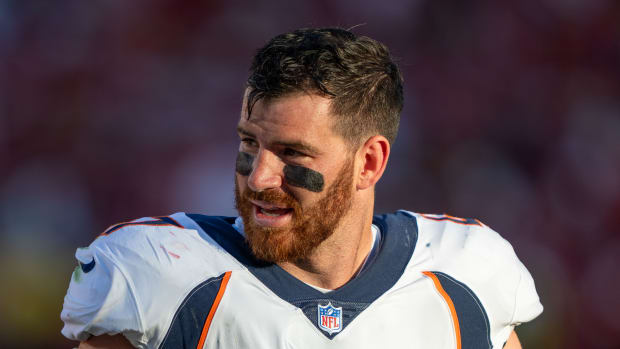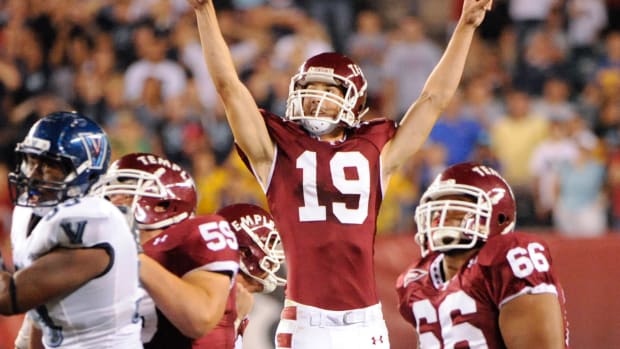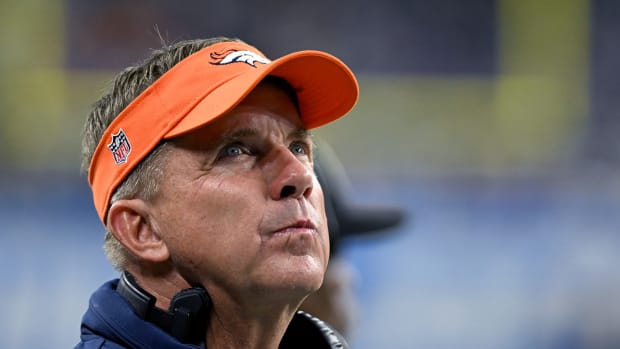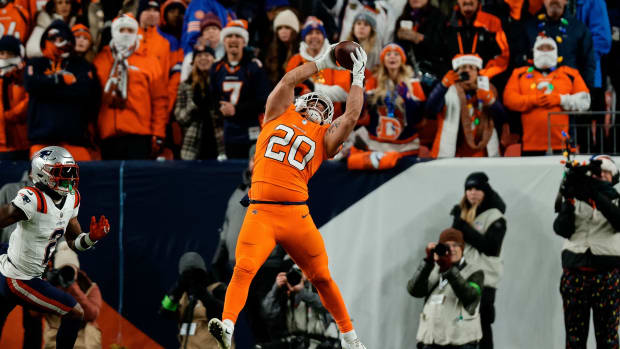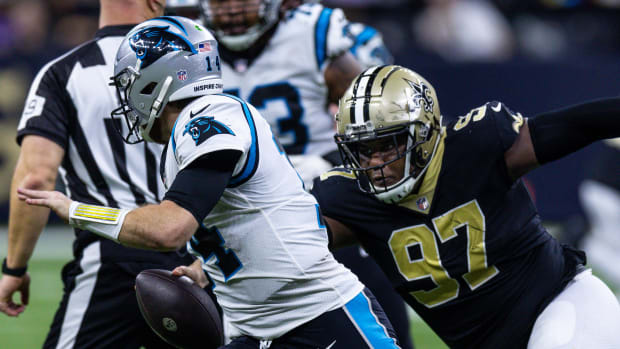Here's How To Know Whether The Broncos Have Been Rebuilding Since 2016
An 0-4 start to the 2019 season isn't what Denver Broncos fans imagined or wanted. To make matters worse, two of the games saw the Broncos take late leads and fail to close out.
To add insult to injury, the Broncos lost second-year pass rusher Bradley Chubb to a season-ending ACL injury.
So now there is a contingent of fans and media member — some whom are my fellow staff members at Mile High Huddle — declaring that the Broncos need to announce they are rebuilding.
One MHH staffer, Erick Trickel, has countered that the Broncos have been in a 'cold' rebuild since 2016. It's true John Elway hasn't admitted this publicly, but there may be a reason why. Let's get to a scenario that would explain the reason.
A team wins a Super Bowl. That team sees its franchise quarterback retire. Would you declare that team is rebuilding?
If you are being honest with yourself, your answer is 'probably not'.
Fans must be honest with themselves
This is where things really went wrong with the Broncos. It wasn't simply that the front office wasn't admitting publicly to fans and media that the team was rebuilding. It was that fans led themselves to believe that the team wasn't rebuilding because they just came off a Super Bowl 50 win.
No, that does not mean the fans are responsible for bad personnel decisions. But it does mean that it's hard for a front office to communicate that message that your team is rebuilding. How can you tell a fanbase that a rebuild is coming when the fanbase doesn't really want to believe it?
And so many Broncos fans fooled themselves into thinking that they would be just fine, because the team went 9-7 the following year, had a promising young QB in Trevor Siemian and the defense was still taking care of business.
But that was really a mirage. The team had been fortunate to have a historically dominant defense the season before, with QB play that was 'good enough' to get the job done, but had important flaws and, once a certain guy named Peyton Manning retired, was now a question mark going forward.
And, as history has shown, that question mark was never answered in the right way.
So if Broncos fans want to avoid falling into that trap again, they need to be more honest with themselves about where things are at and, just as importantly, to understand where things really went wrong with the Broncos.
The trail of evidence
Let's start with two simple observations that tell you whether or not a team is rebuilding.
1. If you don't have a quarterback you know is the guy, you are rebuilding, no matter what else you have on the roster.
2. If you have that quarterback, but you have too many holes elsewhere on the roster and poor depth, you are rebuilding, no matter who the quarterback may be.
The second one might be harder to determine if you have one of those rare QBs who can put a team on his shoulders and carry it to the playoffs. There may be no better example than the Indianapolis Colts, who first had such a quarterback in Peyton Manning, only for Bill Polian to do a bad job building the team in his final years, then had another top QB in Andrew Luck, but had Ryan Grigson doing a poor job of building the team otherwise.
But hey, Indianapolis kept making the playoffs, so who was paying attention?
The Broncos have examples of both of the above-mentioned points, though you have to go back further to see an example of the second one. We'll look at that one first.
Let's go back to 2006 when Mike Shanahan drafted Jay Cutler and sent a message that he would be the new QB to build around. Cutler had talent, the Broncos had just come off a season in which they reached the AFC title game and the team had talent at plenty of positions. You would think the Broncos were poised to remain a playoff contender.
It didn't work out that way. The Broncos failed to close out down the stretch and missed the playoffs. It should have been clear the Broncos had plenty of work to do to become a playoff contender again. Several players had retired, others had been cut or moved on in free agency, and roster holes were becoming evident.
Instead, Shanahan made several bad free agent signings, then traded away draft picks so he could take Jarvis Moss and Tim Crowder. The season before, he traded a draft pick for Javon Walker, a move that seemed like a good idea at the time. However, all of Shanahan's free agent, draft moves and a few of his trades (hello, Javon Walker!) failed to produce results and did more to set back the team than anything else.
By the time 2008 came along, the Broncos had a lot of holes on the defense and, while there weren't many holes on offense, they had a couple of aging players on the offensive line and had no depth. They faced a weak AFC West and, while everyone likes to talk about how the Broncos winning just one game in the final three weeks would have put them in the playoffs, even with running backs hitting injured reserve left and right, it masked the fact that Shanahan's poor team-building strategies caught up with him.
It wasn't just the 2007 draft that did Shanahan in — it was other draft classes not producing enough players worthy of keeping beyond their rookie contracts.
But the larger point is; the Broncos might have had a QB they could build around, but they had too many holes remaining on the roster. Therefore, they were a rebuilding team. Yet some fans wouldn't have bought the idea, even if Shanahan himself said they were rebuilding.
Now let's jump back to the first example. I do think the Broncos realized they were rebuilding after Super Bowl 50 when Peyton Manning retired. Even if they had re-signed Brock Osweiler, it was still unknown at the time if he was the long-term solution. When Osweiler opted to sign with the Houston Texans, Elway had to make other plans.
Trading for Mark Sanchez was a step in the right direction. Attempting to trade for Colin Kaepernick was fine. And Elway wasn't wrong to draft Paxton Lynch, even if he turned out to be a bust.
The real problem came when Elway did the Lynch development plan wrong. Rather than get with Gary Kubiak and declare Sanchez the starter, with Lynch competing with Trevor Siemian for the backup job. That's not guaranteed to work, but you are making it clear that the veteran will start and the rookie you spent a high draft pick to get must earn his spot.
Instead, the Broncos let Sanchez and Siemian duel for the starting job while Lynch was anointed the future heir apparent to let him develop for a year. Then the Broncos decided to cut Sanchez to save money and a draft pick, which left them with no veteran on the roster to keep Siemian and Lynch honest.
When that happened, Lynch took everything for granted and we know what happened from there.
Back to the future
The Broncos, this time around, have a better plan in place in 2019. Joe Flacco was brought into to be the starter, while Drew Lock was drafted to compete for the backup job. Complaining that Kevin Hogan was a bad QB doesn't matter, because Hogan was there to keep Lock honest and remind Lock that he has to earn the backup job if he wants it.
The good news is Lock didn't just outplay Hogan because Hogan was that bad — he played at a level that showed he deserved to be the backup. (It's just unfortunate he injured his thumb.) Thus, the Broncos did right by Lock, making sure he earned his spot.
However, quarterback development isn't the only thing the Broncos did wrong when they were rebuilding earlier. The draft was another area.
I give the Broncos a mulligan on the 2013 draft because it was bad for almost every team. 2014 wasn't that bad, though it would have been nice for Bradley Roby to have become a player worthy of a long-term extension. But the Broncos' 2015 draft haul was mediocre at best, 2016 was solid but marred by the failed development of Lynch, and 2017 was bad (though Garett Bolles and DeMarcus Walker played well this past Sunday, there may be a flicker of hope, but they still have a lot to prove).
It's been said before by others here at MHH and bears repeating; the Broncos spent too many early picks on athletic players with raw talent. Denver wasn't in a position to do that as a rebuilding team — they needed players with refined talent who needed a little or some development to become an important contributor.
And then there's free agency — and this is where I do place some blame on the fanbase, not because they made the decisions, but because they expected too much out of free agency thanks to what Elway did in his first couple of years with the Broncos.
Elway landed Peyton Manning in 2012 and when that worked out, he landed Wes Welker and Dominique Rodgers-Cromartie and found a fan favorite in Terrance Knighton in 2013, then came up big in 2014 with DeMarcus Ware, Aqib Talib, T.J. Ward and Emmanuel Sanders.
All of a sudden, Broncos Country thought that the path to success came through big names in free agency — but they forgot an important point: The Broncos had the quarterback they could build around so they could take a chance. More importantly, you don't depend on going big in free agency to build a team — that's what the draft is for.
I can remember Broncos fans getting impatient about why Elway wouldn't sign this big name or that big name in the following years. In a couple of cases, it may be understandable, but that has less to do with it being a big name than it has to do with how the signing itself was handled.
One example would be Donald Stephenson, who the Broncos signed to play right tackle despite him having a small number of snaps with the Kansas City Chiefs. Denver passed on Mitchell Schwartz, who has become one of the best offensive tackles in the league. I imagine there are reasons why Denver passed on Schwartz, but giving Stephenson a three-year deal was a mistake.
We saw Elway repeat mistakes in free agency with the signing of Menelik Watson to a three-year deal (another player with a small sample size of work) and the signing of Ja'Wuan James which, at the time, I thought was a good idea, but I look back on it now and realize Elway risked too much there.
With James, it's not so much his injury history as it was that James was one of just a handful of good free agents at a position that's in demand. To land James, Elway had to overpay because if he didn't, somebody else would. So Elway gave in and, now, the early returns haven't been promising. James has played a grand total of two series as a Bronco.
But, hey, James was a big name in free agency. So was Kareem Jackson and some might argue Bryce Callahan was, too. All these big names, but did it pay off? Not in the way you think it would.
And while it's easy to say that the Broncos could have signed another big name instead, I think you would find it wouldn't have worked out the way you think it would. This is a Broncos team that wasn't going to get fixed in free agency.
Certain players got paid more than I would have paid them, while others likely had a preference as to which team they wanted to join. The latter isn't something you can help, but the former shows that free agency isn't necessarily the remedy it's thought to be.
Lessons left unlearned
Although Elway has corrected his issues with the draft and appears to have a better QB development plan in place, his free agency approach still needs work. He can't let a major hole on the roster cause him to overspend on a player. And he has to watch himself when he has his eyes on a player who leads a weak free-agent class at his position.
There were also some issues with the players Elway chose to extend. He may have pulled the trigger a bit early on extending Brandon Marshall and he might have been better off using a second-round restricted free agent tender on C.J. Anderson.
Most of all, Elway made a mistake in extending safety Darian Stewart, when he should have let him hit free agency and let the likes of Justin Simmons and Will Parks compete for the starting safety job he vacated.
You want to extend some players, but you want to be careful with how many you extend if you are rebuilding — especially if the player isn't finishing up a rookie contract or coming off a restricted free agent tender.
When you are rebuilding, aging veterans aren't the type of player you want to keep around unless they have demonstrated, beyond any shadow of a doubt, that the player is still playing at a high level. Champ Bailey, who Elway extended in his first year in the front office, was that type of player. Darian Stewart wasn't.
A blueprint for a rebuild
With all this said, what is the real plan for rebuilding? Here's what you need to keep in mind:
- If you don't have a quarterback who is the guy, get a veteran who can at least be the bridge to a quarterback you draft and develop. Make sure that drafted QB understands he is in competition for the job — whether as the starter or the backup — and will always be in a competition until he leaves no doubt he is the guy. That doesn't mean he sits behind the veteran for multiple games or seasons — it means he needs to demonstrate in practice that he should start because he's earned the right as much as the veteran has played his way out.
- Make sure you draft quality talent in the earlier rounds (first through third) and use day three to find depth and players on which you can roll the dice when there's less risk to do so.
- Be smart about free agency, balancing your roster needs versus the level of talent that is available at a particular position versus how much prices are going. Don't overpay for a talent that leads a weak free-agent class and be careful about going into a bidding war for a player if you think he's getting more than you believe should be committed to the position.
- Don't get too eager to extend veterans who are about to become free agents. The best ones to extend are those coming off rookie deals, though you want to be sure they can be part of the rebuilding process. Aging veterans, though, need to be allowed to walk unless they are playing at such a high level that you can't afford to lose them.
Where to go from here
As for what the Broncos should do, I believe the team needs to start Drew Lock at some point in 2019, but I believe the correct time to do it is after the bye week. It's not just about giving him the bye week to prepare — it's so that you get a couple of extra weeks for him to work in practice and demonstrate he's willing to keeping earning the right to start.
He got three preseason games in, which helped, but he missed the final two weeks of the preseason, so he should get a little more time once he's allowed to practice.
The Broncos can ride it out with Joe Flacco through Week 9, while they monitor Lock's recovery and progress. Then, after Week 9, plan on naming Lock the starter for the rest of the season, which still gives Denver seven games to evaluate him.
He also gets five weeks of practice under his belt, allowing him ample time to make up for what he lost in the preseason. (And keep your fingers crossed that Lock doesn't have any other health or injury problems.)
Along the way, the Broncos do need to be open to trade offers — and that means trading players away, not acquiring them. It goes without saying that acquiring Trent Williams is no longer in consideration.
Meanwhile, the Broncos need to listen to offers for Chris Harris, Jr. and Emmanuel Sanders, two players who are likely to spark interest from teams who are looking for that final piece to get to the Super Bowl.
Do keep in mind, though, that not every veteran can be traded. Veterans who are on expiring contracts are easy to move at the right price, but veterans with one or more years left on a deal are harder to move, especially if they aren't playing well. In other words, don't count on any takers for Ronald Leary or Jeff Heuerman.
As for players with expiring contracts, figure out who is worth keeping for the ongoing rebuild and don't get sentimental. That means you need to move on from aging players who aren't elite and you shouldn't extend somebody just because he's a feel-good story.
When you prepare for free agency, be smart about it. Focus on the positions at which available talent is deep because you are more likely to get a quality signing. Don't trip over yourself for the big prize to pacify fans. Most of all, don't overpay for the best free agent in a weak overall class.
As for the draft, stick with the approach to the past couple of seasons — focus on team leaders with refined talent who can get better with more time and work. You can still roll the dice on a player on day three, but don't do it on the first two days.
The Takeaway
What I will remind the fans is this; every team goes through a rebuild at some point, but you don't have to wait for the team to say so to know when it's happening. To determine if it's the case, always ask yourself the following:
"Do we have the quarterback we can build around, yes or no?" If no, you're rebuilding, don't deny it. If yes, then ask yourself this:
"Do we have the bulk of our other needs addressed?" If you don't have enough, you're rebuilding. If you do, you're not.
Don't wait for the Broncos to tell you what they're doing. Look at the roster yourself to answer your question. Only then can you be honest with yourself with where the Broncos stand and keep expectations tempered.
Follow Bob on Twitter @BobMorrisSports and @MileHighHuddle.




